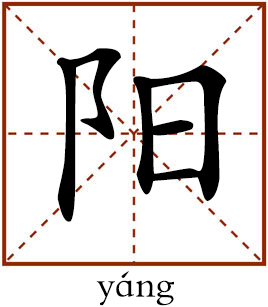Sun

This character refers to the sun. In Chinese philosophy, yang is positive, bright, active and masculine. Yin, by contrast, is characterized as passive and feminine. Yin and yang are considered complementary forces that interact to form a dynamic system in which the whole is greater than the assembled parts.
阳春白雪
yáng chūn bái xuě
Yang chun literally refers to the sun in spring, creating a sense of refreshment and vigor. Bai xue is snow, a symbol of purity and dignity. Yang Chun and Bai Xue are both the names of ancient melodies composed by Shi Kuang (572–532 BCE) during the Spring and Autumn period. Today, it is used as a metaphor especially for arts related subjects that are too profound and highbrow to understand. Its opposite phrase in this sense is Xia Li Ba Ren, or the Song of the Rustic Poor, which indicates more popular literature or arts.
This proverb originated from the Chu Ci (Verses of Chu), an anthology of Chinese poetry during the Warring States period (475–221 BCE). King Xiang of Chu asked a famous writer named Song Yu why Song was not popular among the public. Song answered that when a singer sang the Xia Li Ba Ren in the state of Chu, people joined in the chorus passionately. However, when he sang the Yang Chun Bai Xue, there was little response. Song used this proverb to imply that sometimes it is difficult for the public to accept or welcome a genius because their talented thoughts and ideas are beyond general levels of intelligence.
丹凤朝阳
dān fèng cháo yáng
Dan feng refers to red phoenix and chao yang is the sun in the morning. This proverb, taken literally, refers to the scarlet phoenix flying towards the sun. It often serves as a metaphor for a wise ruler selecting talented officials. This proverb comes from the oldest existing collection of Chinese poetry, The Book of Poetry. It depicts an auspicious moment with the verses, “The phoenix sings a joyful air/ On the lofty mount o’er there./ The plane trees rise into the air,/ On the southern slope o’er there.” It implies that some talented or extraordinary people live in a good era, because they have been discovered by wise rulers and have the opportunity to serve the country.
(edited by REN GUANHONG)
